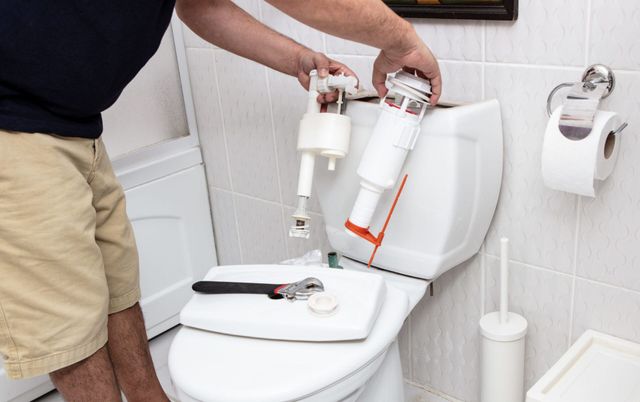Essential Bathroom Plumbing Guidelines for Beginners
Essential Bathroom Plumbing Guidelines for Beginners
Blog Article
This great article on the next paragraphs involving 11 Must-Read Tips for Plumbing a New House is seriously engaging. Read on and draw your own conclusions.
:max_bytes(150000):strip_icc()/woman-fixing-sink-de54d945295a438c86072f78415c3e0e.jpg)
For new house owners, understanding and keeping bathroom pipes can conserve both money and time by avoiding costly issues down the line. Below are some crucial shower room pipes ideas to aid you keep every little thing running smoothly.
Plan For Cold Weather
Safeguard your pipes from freezing throughout cold weather by protecting pipelines in unheated locations like basements, attic rooms, and garages. Throughout severe cool, let cold water drip from faucets served by revealed pipelines to help protect against freezing.
Schedule Normal Maintenance
Think about scheduling annual examinations with an accredited plumber. They can spot concerns that you could miss out on, such as surprise leakages or deterioration on pipes and components. Regular upkeep assists expand the life of your plumbing system and can prevent emergency situations.
Familiarize Yourself with the Key Shut-Off Valve
Recognizing where the major water shut-off shutoff lies in your home is important. This permits you to quickly shut off the water supply in case of major leakages or throughout pipes emergencies, stopping comprehensive water damages.
Regularly Evaluate for Leakages
Little leaks can bring about huge issues. Routinely check under sinks, around bathrooms, and near plumbing fixtures for any type of indicators of leaks. Look for wetness, tiny drips, or rust. Catching and repairing leaks early can protect against more severe damage and save water.
Maintain Your Hot Water Heater
Ensure your water heater is set to a suitable temperature (typically about 120 degrees Fahrenheit) to stop scalding and reduce power usage. Flush the storage tank annually to remove debris build-up, which can decrease the effectiveness and lifespan of your heating unit.
Upgrade Your Components
If your home has older fixtures, consider updating to much more efficient models. Modern toilets, showerheads, and faucets are made to make use of less water while supplying excellent stress, which can considerably minimize your water costs and ecological impact.
Beware with DIY Pipes Fixes
While it's alluring to take care of all home repairs by yourself, beware with pipes. Some problems could need expert expertise, specifically if they involve major water lines or drain fixings. Working with a professional can occasionally be a lot more cost-efficient than do it yourself, particularly if it stops further damages.
Don't Neglect Slow Drains Pipes
If your sink or bathtub is draining slowly, it's often an indication of an obstruction developing. Addressing this very early can avoid a complete obstruction. Utilize a bettor or a plumbing technician's serpent to remove particles. Stay clear of making use of chemical drainpipe cleansers as they can harm your pipelines over time.
Know What Not to Flush
Bathrooms are not garbage disposals. Avoid flushing anything besides toilet tissue and human waste. Items like wipes, feminine hygiene products, and cotton bud need to be dealt with in the garbage to avoid blockages and drain backups.
Install Strainers in Drains
Area filters in your sink and tub drains pipes to catch hair and other debris before they enter your plumbing system. Cleaning up the filters routinely will aid avoid build-up and maintain water moving freely.
Conclusion
Comprehending and keeping your home's bathroom plumbing can avoid numerous common problems. By complying with these vital ideas, you can guarantee your washroom continues to be practical and effective, conserving you money and time over time.
Essential Plumbing Tips for Homeowners: Keep Your Pipes Flowing Smoothly
As a homeowner, understanding the basics of your plumbing system can save you time, money, and a lot of headaches. Plumbing issues can range from minor annoyances like dripping faucets to major problems like burst pipes that cause significant damage. This guide provides essential tips to help you maintain your plumbing system and tackle common issues.
Understanding Your Plumbing System
Supply System: Brings fresh water into your home from a municipal source or a well. Drain-Waste-Vent System: Removes wastewater and vents sewer gases outside. Fixtures and Appliances: Includes sinks, toilets, showers, dishwashers, and washing machines. Basic Maintenance Tips
Regular Inspections: Periodically check for leaks, corrosion, and other signs of wear and tear. Look under sinks, around toilets, and near water heaters. Know Your Main Shut-Off Valve: In case of a major leak, you’ll need to shut off the water quickly. Ensure everyone in your household knows where the main shut-off valve is located. Prevent Frozen Pipes: In cold climates, insulate exposed pipes and let faucets drip during extreme cold to prevent freezing. Use Strainers: Install strainers in sinks and tubs to catch hair, food particles, and other debris that can cause clogs. Common Plumbing Issues and Solutions
Clogged Drains:
Prevention: Avoid pouring grease down the drain and use drain screens to catch debris. DIY Fix: Use a plunger or a plumbing snake to clear minor clogs. For stubborn clogs, a mixture of baking soda and vinegar can sometimes help. Leaky Faucets:
Prevention: Replace washers and seals regularly. DIY Fix: Turn off the water supply, disassemble the faucet, and replace worn parts.

Call Today Report this page